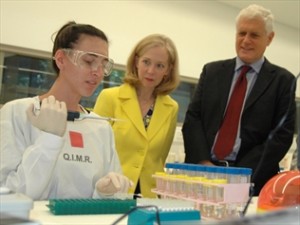in brief: new study hopes to eradicate anorexia nervosa
A new genetic study hopes to eradicate anorexia nervosa. The worldwide study, lead by researchers in Queensland, will explore the relationship between biology and psychology in the onset of the clinical eating disorder.
Data collectors from Queensland Institute of Medical Research are recruiting more than 1200 women from the Australia to take part in the study. Women from the US, Denmark and Sweden are also contributing to the study.
QIMR Genetic Epidemiology group head professor Nick Martin said the four-year study could shed light on the onset and potential treatment of anorexia.
‘The hope is we will actually find genes that predispose and increase risk of a person developing anorexia,’ he said.
‘We don’t expect there will be any one gene but instead there will be quite a lot of genes contributing to the risk.’
Studies have suggested that there is a genetic disposition to schizophrenia and bipolar disorder, which lead researchers to believe that anorexia may similarly be influenced by genes.
‘And our medical research has now reached a stage where we can now actually try to find the particular genes involved and hopefully this will lead us to cures’, says Martin.
One in every 100 girls is affected by the clinical eating disorder. Research on behalf of National Eating Disorder Collaboration found that eating disorders are becoming increasingly prevalent in Australia. According to this research, fewer than 50% of sufferers make a full recovery.
Current treatments centre on psychological intervention, but some specialists, such as the head researcher of the US component of the study, Professor Cynthia Bulik, believe that it is not purely a mental illness.
‘Most of us, when we get hungry, get very irritable and it’s not a pleasant feeling. People who are vulnerable to anorexia have a different response to starvation, they find that it calms them. We think there might be something fundamentally different in their biology that puts them at risk.’
‘Right now, we have no medications that are effective in the treatment in anorexia nervosa, and in part that is because we don’t understand the biology.’ she said.
Bulik said that while environmental factors contribute to the onset of anorexia, 40-60% of vulnerability for the disorder is due to genetics. Identifying the genes responsible could lead to the eradication of anorexia nervosa.
Participants will be asked to fill out an online survey and provide a blood sample.


